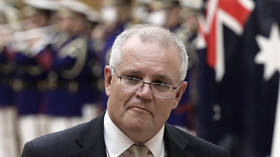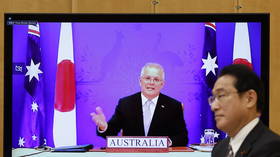Australia accuses China of ‘foreign interference’ after PM’s WeChat blocked

The chairman of Australia’s parliamentary intelligence committee has accused China of interfering with the country’s democracy after Prime Minister Scott Morrison’s WeChat account was allegedly blocked.
Victoria Senator James Paterson – who serves as chair of Australia’s Parliamentary Joint Committee on Intelligence and Security – claimed on Monday that Morrison has been unable to access his account on the Chinese social network for several months.
“My view is, given that WeChat is such a closely controlled company by the Chinese Communist Party, that this amounts to foreign interference in our democracy, and in an election year no less,” Paterson said during an interview with 4BC.
“It’s particularly concerning that they’ve sought to punish the prime minister, and prevent him from posting on it, but they’ve continued to allow [Australian opposition leader] Anthony Albanese to post on it, and post his attacks on the government on it, which we now can’t respond to.”
Paterson called on all Australian politicians to boycott WeChat in response, claiming “no one should be legitimizing their censorship and their control over our public debate.”
The South China Morning Post reported on Monday that it was unable to find Morrison’s account on WeChat in China, while Albanese told 4BC that he was concerned by any “national security implications” that the alleged blocking might have.
Albanese did note, however, that Australia hasn’t “heard anything from the prime minister himself about these issues,” and said that he would speak with Morrison directly about the matter “rather than a backbench MP” – an apparent dig against Paterson.
Politicians in Australia reportedly use the Chinese social network to reach Chinese Australians, who represent a significant minority of the Australian population.
Hong Kong-born Liberal Party MP Gladys Liu announced on Monday that she would no longer use WeChat in protest over the alleged blocking, accusing China of “interference” in Australia’s democracy.
Liu’s district of Chisholm has a large Chinese-Australian population, with 19.7% of those in the area reporting Chinese ancestry – thousands more than those in the district with English and Australian ancestry.












